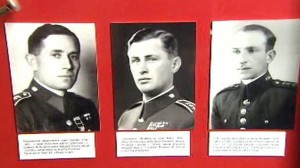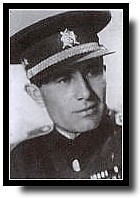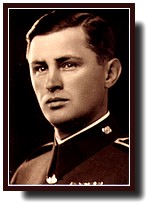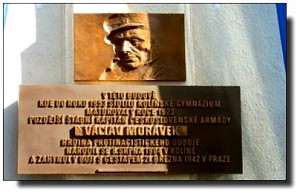The Three Kings: Heroes of the Czechoslovak resistance
By Tracy A. Burns
Contributions to the Czech resistance
 A major player in the Czech resistance movement during the Nazi Occupation, The Three Kings – a code name coined by the Nazis who hunted them – made significant contributions to the Czechoslovak cause from 1939 to 1942. Working for the resistance group Defense of the Nation set up by former army officers, protagonists Josef Balabán, Josef Mašín, and Václav Morávek relayed information about life in the Protectorate to the Czechoslovak government-in-exile in London via radio transmitters called Sparta I and Sparta II. News often involved the movement of goods and German transport plus political and economic developments. These resistance fighters also carried out acts of sabotage by staging bomb attacks and setting fire to factories. They collected weapons for the resistance and helped with the publishing and distribution of the underground magazine V boj! as well. In addition, the three-man team helped agents escape from the Protectorate.
A major player in the Czech resistance movement during the Nazi Occupation, The Three Kings – a code name coined by the Nazis who hunted them – made significant contributions to the Czechoslovak cause from 1939 to 1942. Working for the resistance group Defense of the Nation set up by former army officers, protagonists Josef Balabán, Josef Mašín, and Václav Morávek relayed information about life in the Protectorate to the Czechoslovak government-in-exile in London via radio transmitters called Sparta I and Sparta II. News often involved the movement of goods and German transport plus political and economic developments. These resistance fighters also carried out acts of sabotage by staging bomb attacks and setting fire to factories. They collected weapons for the resistance and helped with the publishing and distribution of the underground magazine V boj! as well. In addition, the three-man team helped agents escape from the Protectorate.
The relaying of information
Reporting news to the government-in-exile was one of the group’s main tasks. They received information from resistance agent Paul Thümmeland cooperated with a network of railway employees and postal workers. Czech policemen serving as translators for the Germans also supplied information. The Three Kings also kept in contact with Soviet diplomats.
Sabotage
Another objective involved sabotage. The group was responsible for bomb attacks in Leipzig, Munich, and Berlin. Two attacks in Berlin were the most successful. Ctirad Novák, Mašín’s brother-in-law who was a resistance agent pretending to collaborate with the Germans, placed one suitcase of explosives in police headquarters and another at the Ministry of Air Travel. However, another significant attack did not deliver the desired results. When the Three Kings tried to assassinate military commander and leading member of the Nazi Party Heinrich Himmler in 1941 by blowing up his train near a Berlin station, the bomb went off as expected. Unfortunately, Himmler’s train was either delayed or diverted to another station due to technical problems, depending on which source is consulted. The group successfully bombed transports of German soldiers by adding an explosive to coal on the locomotive’s tender.
Josef Balabán
 Trained as a locksmith, Balabán enlisted in the army and was sent to the Russian front. After being captured in 1915, he joined the Czechoslovak Legion. When the war veteran returned to Czechoslovakia, he climbed up the ranks to lieutenant colonel. As the Nazis began to occupy Bohemia and Moravia, he contributed to the resistance movement and became leader of the Three Kings. Balabán was arrested in Prague’s Dejvice district in April of 1941. Even torture could not convince him to betray his two colleagues. He was executed on October 3, 1941.
Trained as a locksmith, Balabán enlisted in the army and was sent to the Russian front. After being captured in 1915, he joined the Czechoslovak Legion. When the war veteran returned to Czechoslovakia, he climbed up the ranks to lieutenant colonel. As the Nazis began to occupy Bohemia and Moravia, he contributed to the resistance movement and became leader of the Three Kings. Balabán was arrested in Prague’s Dejvice district in April of 1941. Even torture could not convince him to betray his two colleagues. He was executed on October 3, 1941.
Josef Mašín
 After being expelled from the Austro-Hungarian military academy, Mašín joined the army and was sent to the Russian front, where he deserted. From 1916 to 1921, he served in the Czechoslovak Legion. Mašín returned to Czechoslovakia to become a high-ranking military officer during the 1920s but finally left the army to join the resistance. Shortly after the Occupation began, Mašín was able to hide weapons he took from the Ruzyně garrison, where he was the commander. Disguised as a Nazi soldier, Mašín was able to enter the barracks in Prague’s Vršovice district. Thanks to false documents, he was left with a car full of weapons. The Gestapo caught Mašín broadcasting to London from his Prague apartment. Morávek and the radio operator managed to escape via the balcony, but Mašín was wounded and arrested. Later, he was tortured but did not give his tormentors any information. The brave fighter was executed on June 30, 1942. Mašín’s last words were: “Long live Czechoslovakia!” Mašín’s two sons, Ctirad and Josef Jr. became renowned Communist resistance fighters after the war and made a death-defying escape through the Iron Curtain. Punished for her sons activities, Josef senior’s wife was sentenced to 25 years in prison in 1953 and died while incarcerated three years later.
After being expelled from the Austro-Hungarian military academy, Mašín joined the army and was sent to the Russian front, where he deserted. From 1916 to 1921, he served in the Czechoslovak Legion. Mašín returned to Czechoslovakia to become a high-ranking military officer during the 1920s but finally left the army to join the resistance. Shortly after the Occupation began, Mašín was able to hide weapons he took from the Ruzyně garrison, where he was the commander. Disguised as a Nazi soldier, Mašín was able to enter the barracks in Prague’s Vršovice district. Thanks to false documents, he was left with a car full of weapons. The Gestapo caught Mašín broadcasting to London from his Prague apartment. Morávek and the radio operator managed to escape via the balcony, but Mašín was wounded and arrested. Later, he was tortured but did not give his tormentors any information. The brave fighter was executed on June 30, 1942. Mašín’s last words were: “Long live Czechoslovakia!” Mašín’s two sons, Ctirad and Josef Jr. became renowned Communist resistance fighters after the war and made a death-defying escape through the Iron Curtain. Punished for her sons activities, Josef senior’s wife was sentenced to 25 years in prison in 1953 and died while incarcerated three years later.
Václav Morávek
 After graduating from a Czech military academy, Morávek became a staff officer with the rank of captain. When the Occupation began, he was demoted to a clerk. As a member of the resistance, he always carried with him two pistols, many gun magazines, and a pocket Bible. Devoutly Christian, he said, “I believe in God and in my pistols.” Each month Morávek took V boj! magazine to Gestapo headquarters. He had many secret identities and was known for his adventures. For instance, a disguised Morávek went into the bar frequented by Oskar Fleischer, the leader of the Gestapo team trying to capture the Three Kings. The resistance fighter even lit a cigarette for Fleischer, who did not recognize him. Later he wrote Fleischer a letter bragging about the incident and stating that thanks to him he won a 1000-crown bet. That was by no means his only heroic exploit. In March of 1940, two thousand German policemen and 200 secret agents were looking for Jan Smudek, who had shot a German police officer. Morávek was able to accompany Smudek to a Prague train station, and Smudek got out of the country safely. Morávek was finally caught by the Nazis while meeting secretly with Thümmel. During the shootout that followed he was killed by an enemy bullet, though the Germans officially called it a suicide.
After graduating from a Czech military academy, Morávek became a staff officer with the rank of captain. When the Occupation began, he was demoted to a clerk. As a member of the resistance, he always carried with him two pistols, many gun magazines, and a pocket Bible. Devoutly Christian, he said, “I believe in God and in my pistols.” Each month Morávek took V boj! magazine to Gestapo headquarters. He had many secret identities and was known for his adventures. For instance, a disguised Morávek went into the bar frequented by Oskar Fleischer, the leader of the Gestapo team trying to capture the Three Kings. The resistance fighter even lit a cigarette for Fleischer, who did not recognize him. Later he wrote Fleischer a letter bragging about the incident and stating that thanks to him he won a 1000-crown bet. That was by no means his only heroic exploit. In March of 1940, two thousand German policemen and 200 secret agents were looking for Jan Smudek, who had shot a German police officer. Morávek was able to accompany Smudek to a Prague train station, and Smudek got out of the country safely. Morávek was finally caught by the Nazis while meeting secretly with Thümmel. During the shootout that followed he was killed by an enemy bullet, though the Germans officially called it a suicide.
Czech recognition
On May 8th, 2005, Czech President Václav Klaus made all three heroes major-generals in memoriam. The following year a commemorative plaque was placed on the spot in Studenská Street of Prague 6, where Balabán was arrested in 1941. The Three Kings proved an invaluable source of information for the government-in-exile, and their daring acts of sabotage greatly aided the resistance effort. These three risked their lives for Czechoslovakia not once but every day. Their feats sound as if they came from a novel rather than from real life. The names Josef Balabán, Josef Mašín and Václav Morávek will forever be connected with Czechoslovak heroism.




